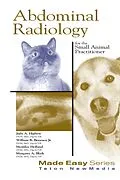This text is meant to be a handy cookbook which can be quickly grabbed from the self and provide the practitioner with essential information on abdominal radiography. This practical presentation consists of the uses and interpretations of abdominal plain film for the small animal practitioner or technician. The text describes the normal appearance
Autorentext
Judith Hudson, William Brawner, Merrilee Holland, Margaret Blaik
Inhalt
ContentsSection 1 Introduction and Radiographic TechniqueSome Helpful HintsIndications for Abdominal RadiographyRole of Radiology in Patient ManagementSteps to Good Film ReadingStep One: Technical Factors for Abdominal RadiographyStep Two: Using a System for InterpretationStep Three: Roentgen or Radiographic SignsStep Four: Differential DiagnosesStep Five: What's Next?Section 2 Normal Radiographic Anatomy of the AbdomenViewing the FilmStomachDuodenumCecumKidneySpleenDiaphragmLiverBladderProstateLymph NodesSection 3 Peritoneal CavityNormal AppearanceIncreased Peritoneal OpacityTerminology - SynonymsDecreased Peritoneal Opacity-GasCauses of Intraluminal Gas AccumulationCauses of Extraluminal Gas AccumulationRadiographic (Roentgen) Signs of Extraluminal GasDecreased Peritoneal Opacity-FatCauses of Abnormal Fat OpacitiesRadiographic (Roentgen) SignsDisruption of Borders of the Peritoneal CavityDiaphragmatic HerniaHiatal HerniaPeritoneopericardial HerniaInguinal or Ventral HerniaPerineal HerniaSection 4 Intra-abdominal MassesEvaluation of an Abdominal MassGastric MassesGeneralized HepatomegalyFocal HepatomegalyDifferentiate the StomachRenal MassesAdrenal MassDiffuse SplenomegalyFocal SplenomegalyMesenteric/Enteric MassesPancreatic MassesOvarian MassesMasses Involving Urinary BladderProstatic MassesUterine MassesCaudal Sublumbar MassesSection 5 Alimentary TractContrast MediaBariumIonic Organic IodineNon-Ionic Organic Iodine PreparationsEsophageal/Gastrointestinal Contrast ProceduresRadiography of the EsophagusContrast Examination of the Esophagus-Esophag
